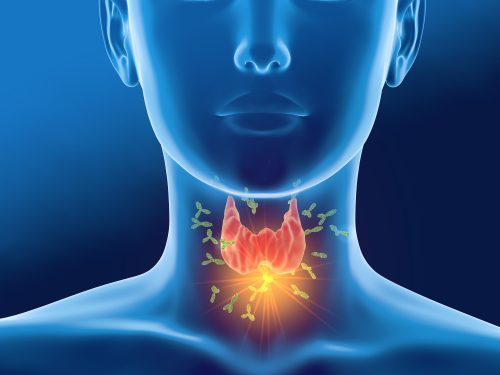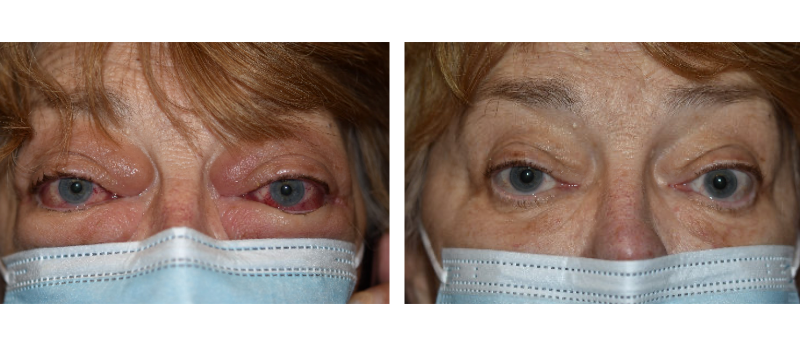Thyroid eye disease can be extremely disfiguring for some patients. Traditionally, there was little that could be done to reverse these changes in and around the eyes. However, a new treatment offered at Mass Eye and Ear may provide hope for patients who experience moderate to severe forms of the disease.
A new medication called teprotumumab (brand name Tepezza) is increasingly being used to help patients with moderate to severe thyroid eye disease. This condition directly affects the eyes and eye sockets in people with an overactive thyroid caused by an autoimmune disorder called Graves’ disease.
“Patients with thyroid eye disease desperately want help for their painful, disfiguring and potentially blinding condition. But before now, specialists could usually prevent patients from losing their vision, but had to have a difficult conversation to explain that they would likely never look the same again,” Suzanne K. Freitag, MD, director of Ophthalmic Plastic Surgery Service and co-director of the Center for Thyroid Eye Disease and Orbital Surgery, told Focus. “That’s why this new treatment has been considered a miracle by some patients.”
Debilitating effects on vision and appearance for some patients

The thyroid is an organ that makes hormones, which affects bodily functions, including growth and development, body temperature, heart rate, and menstrual cycles and weight, according to the National Institutes of Health. When the thyroid becomes overactive and produces too many hormones that is known as hyperthyroidism. About one in 200 people have Graves’ disease, and the increase in hormones it causes can lead to problems throughout the body, including the eyes for about 30 to 70 percent of people with the autoimmune disorder.
People with active thyroid eye disease may have their eyes bulge and fall forward in front of their lids and appear red and watery. Their eyes can also feel gritty and dry, with pressure, pain and sensitivity to light. Their lids may become swollen and open too, resulting in the appearance of being scared or surprised, which can be socially embarrassing. They may also experience issues with vision, such as double vision, and in some cases, vision loss.
Bulging eyes and vision issues can persist once the disease is no longer active, with an estimated 5 to 10 percent of patients losing their vision entirely. Some people experience mild versions of the disease with minor symptoms that go away on their own. However, those with more severe cases can have worse outcomes and sometimes permanent symptoms on their eyes, eyelids and eye sockets.
Limitations of thyroid eye disease treatments
Patients with thyroid eye disease are often referred to a specialist at a place like Mass Eye and Ear through their endocrinologist, thyroid surgeon, general ophthalmologist or primary care doctor.
Mild cases of thyroid eye disease can be treated with eye drops and sunglasses to reduce symptoms and light sensitivity. Treatments to reduce the effects of an overactive thyroid given by an endocrinologist may also help the eyes.
People with moderate to severe thyroid eye disease have traditionally been treated with monthslong courses of intravenous or oral steroid medications that can help manage redness, swelling, pain and vision issues caused by inflammation. These patients have to be monitored to see if their vision worsens, and without treatment, some will lose their vision.
Steroids can cause side effects throughout the body and may exacerbate some other symptoms of hyperthyroidism. In more severe cases, steroids will be unable to reverse some of the physical effects. Radiation is another treatment option, which can be combined with steroids to reduce inflammation.
Surgery is also performed in an effort to improve symptoms in moderate to severe cases. Dr. Freitag co-founded the Center for Thyroid Eye Disease and Orbital Surgery with otolaryngologist Benjamin S. Bleier, MD, and neuro-ophthalmologist Dean M. Cestari, MD, which provides state-of-the-art surgical care for people with thyroid eye disease. One procedure offered is endoscopic orbital decompression surgery, which is performed through the nose (instead of an incision near the eye) to create more space in the eye socket, reduce orbital pressure and lessen some of its related side effects. Other operations include surgeries to the eyelid and muscles around the eyes.
A promising new option for some patients

Teprotumumab was approved by the U.S. Food and Drug Administration in January 2020 as the first treatment developed specifically for thyroid eye disease. The drug blocks a protein that is thought to play a role in formation of these symptoms. An infusion is administered every three weeks over the course of six months. The drug was initially thought to be most beneficial for patients soon after the onset of symptoms; however, it has been shown to be helpful in patients later in the chronic stages of the disease as well.
“Some patients are unable to recognize themselves after treatment; it really has become a game-changer for management of this disease,” said Dr. Freitag. “Not everyone is a candidate, and a thorough evaluation may help determine the best course of action for a patient.”
The treatment is costly, and not covered by all insurance providers. Doctors are hopeful that more insurers will cover the treatment as additional studies are conducted.
Dr. Freitag serves on the advisory board and as a consultant for the company, Horizon Therapeutics, which makes Tepezza. She gives lectures and conducts research on the medication.
To find out if you are a candidate for this treatment or others offered for thyroid eye disease, please call 617-573-5550.
About the Expert
 Suzanne K. Freitag, MD, is director of the Ophthalmic Plastic Surgery Service and co-director of the Center for Thyroid Eye Disease and Orbital Surgery at Mass Eye and Ear. She sees patients at the Main Campus (243 Charles Street).
Suzanne K. Freitag, MD, is director of the Ophthalmic Plastic Surgery Service and co-director of the Center for Thyroid Eye Disease and Orbital Surgery at Mass Eye and Ear. She sees patients at the Main Campus (243 Charles Street).